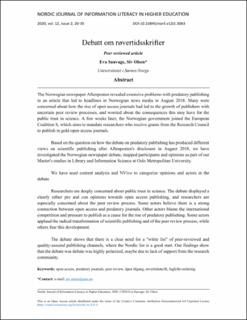| dc.contributor.author | Sauvage, Eva | |
| dc.contributor.author | Olsen, Siv-Guro | |
| dc.date.accessioned | 2021-03-26T11:28:10Z | |
| dc.date.available | 2021-03-26T11:28:10Z | |
| dc.date.created | 2020-11-30T10:50:13Z | |
| dc.date.issued | 2020 | |
| dc.identifier.citation | Sauvage, E., & Olsen, S. (2020). Debatt om røvertidsskrift. Nordic Journal of Information Literacy in Higher Education, 12(2). | en_US |
| dc.identifier.issn | 1890-5900 | |
| dc.identifier.uri | https://hdl.handle.net/11250/2735706 | |
| dc.description.abstract | Introduction: The Norwegian newspaper Aftenposten revealed extensive problems with predatory publishing in an article that led to headlines in Norwegian news media in August 2018. Many were concerned about how the rise of open access journals had led to the growth of publishers with uncertain peer review processes, and worried about the consequences this may have for the public trust in science. A few weeks later, the Norwegian government joined the European Coalition S, which aims to mandate researchers who receive grants from the Research Council to publish in gold open access journals. Method: Qualitative content analysis Results: Researchers are deeply concerned about public trust in science. The debate displayed a clearly either pro and con opinions towards open access publishing, and researchers are especially concerned about the peer review process. Some actors believe there is a strong connection between open access and predatory journals. Other actors blame the international competition and pressure to publish as a cause for the rise of predatory publishing. Some actors applaud the radical transformation of scientific publishing and of the peer review process, while others fear this development. Discussion: We discuss how this may affect research support at university libraries. Coalition S faced great opposition among the majority of Norwegian researchers, while the librarians who participated in the debate were in unison positive. The challenges of predatory publishers may intensify in the years to come with the introduction of Coalition S and a radical reorganization of scientific publishing. Conclusion: The debate shows that there is a clear need for a "white list" of peer-reviewed and quality-assured publishing channels, where the Nordic list is a good start. Librarians have special expertise on metadata formats and knowledge about information literacy that can help researchers with quality assessment. | en_US |
| dc.language.iso | nob | en_US |
| dc.rights | Navngivelse-Ikkekommersiell 4.0 Internasjonal | * |
| dc.rights.uri | http://creativecommons.org/licenses/by-nc/4.0/deed.no | * |
| dc.title | Debatt om røvertidsskrift | en_US |
| dc.type | Peer reviewed | en_US |
| dc.type | Journal article | en_US |
| dc.description.version | publishedVersion | en_US |
| dc.rights.holder | © Eva Sauvage & Siv Olsen. | en_US |
| dc.source.pagenumber | 20-35 | en_US |
| dc.source.volume | 12 | en_US |
| dc.source.journal | Nordic Journal of Information Literacy in Higher Education, NORIL | en_US |
| dc.source.issue | 2 | en_US |
| dc.identifier.doi | https://doi.org/10.15845/noril.v12i2.3063 | |
| dc.identifier.cristin | 1853990 | |
| cristin.ispublished | true | |
| cristin.fulltext | original | |
| cristin.qualitycode | 1 | |

